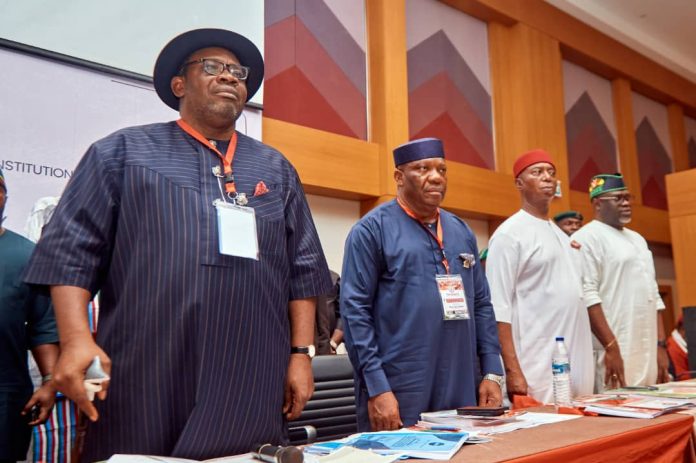UYO, NIGERIA — The recently concluded South South Zonal Public Hearing
on the Review of Nigeria’s 1999 Constitution marked a pivotal moment for
citizens of the Niger Delta to speak with one voice and address for themselves what has been a bane to their development for so long.
Yours sincerely was privileged to lead a delegation
from the Akwa Ibom South Democracy Coalition to contribute to this
national discourse.
As Executive Secretary and Convener of Akwa Ibom South Democracy
Coalition, I began by commending the Senate Committee on
Constitution Review (South South) — under the Chairmanship of
Distinguished Senator Henry Seriake Dickson, being the Chairman of South
South Caucus in the 10th Senate — for providing a platform for voices
across the South South Geopolitical Zone to be heard. The presence of distinguished
personalities such as the President of the Senate,
Senator Godswill Akpabio; the Governor of Akwa Ibom State,
represented by the Deputy Governor, Senator Akon
Eyakenyi, and our own Distinguished Senator Ekong Sampson,
amongst a host of other Senators from all the Six States of the South
South Geopolitical region of Nigeria who were in attendance, lent further
gravitas to what was an immensely consequential event.
Akwa Ibom South Democracy Coalition’s memorandum, jointly presented by
my humble self, Chief Mrs. Abigail Edohoeket (Focal Person, Women
Integration), and Engr. Ben Edenseting (Publicity Secretary), was
a passionate yet a carefully reasoned articulation of the long-standing
structural inequities confronting our region. It was not simply a
document; it was a collective cry for justice, dignity, and fair
treatment—an echo from the oil-laden yet environmentally battered
districts of Akwa Ibom South and the broader Niger Delta region.
Our key proposals addressed five core pillars of constitutional reform
that must no longer be ignored if we are to forge a sustainable and
equitable Nigeria, viz:
A Strengthened Derivation Principle
that reflects the principle of justice, ensuring that regions which give
the most to the Federation receive a fair share of the benefits;
Enhanced Resource Control by Host States and Communities:
Allowing those who live with the consequences of resource extraction to
have a say in its management and proceeds;
Constitutionally Backed Corporate Social Responsibility (CSR):
Making it mandatory for International Oil Companies (IOCs) and
multinationals to deliver developmental interventions in communities negatively impacted by their activities;
Environmental Justice and Ecosystem Restoration:
A Call for urgent legislative intervention to address the severe
degradation of farmlands, waterways, and biodiversity in the Niger
Delta region and
A Participatory Federalism that Works for All:
One that reflects the multi-ethnic, multi-regional, and resource-diverse
makeup of Nigeria—not just in theory, but in practice.
These proposals are not mere idealistic demands. They stem from
generations of neglect, economic extraction without compensation, and
the lived experiences of communities whose stories rarely make global
headlines.
The recognition and applause the group received at the Public Hearing were
affirmations not just of our clarity of thought, but also the urgency of
our advocacy. However, the mission does not end with a successful
presentation. We see this as the beginning of a broader campaign to
elevate these issues onto national and international platforms.
Why the International Community Should Care
The Niger Delta region of Nigeria is not just the nation’s economic life blood, It is part of a
global ecosystem where the interplay between energy extraction,
environmental sustainability, and human rights is increasingly
scrutinized. From the lens of international development, climate
justice, and sustainable governance, our memorandum speaks to universal
concerns:
The degradation of our environment, the marginalisation of our people,
and the undermining of local governance all of which are issues that resonate far
beyond our borders.
We, therefore, call on global partners—development
agencies, civil society groups, international media, and corporate
stakeholders—to take more than a passing interest in the concerns raised above and lend their voice and support frameworks
that advance local agency and equitable reform in regions like ours.
The Path Ahead
We look to the National Assembly, particularly the plenary of the
Senate, to give thoughtful consideration to the issues we have raised.
But more importantly, we call on civil society groups across Nigeria and Africa
to step into the arena. For too long, silence has emboldened injustice.
Civic leadership, when purposeful and well-organised, can shift
paradigms.
At Akwa Ibom South Democracy Coalition, we remain committed to building
a strong civic voice for Akwa Ibom South and other marginalised regions.
We will continue to track the progress of the constitutional review
process, and we will not relent in our advocacy—locally and
globally—until fairness is codified, not just promised.
This is our civic responsibility. This is our generational duty.
To access the full memorandum or support our ongoing campaign, please, contact:
AKWA IBOM SOUTH DEMOCRACY COALITION through yours sincerely on:
( jamesokon@attractionsmedia.info or +234 706 542 5649
Nkereuwem James





